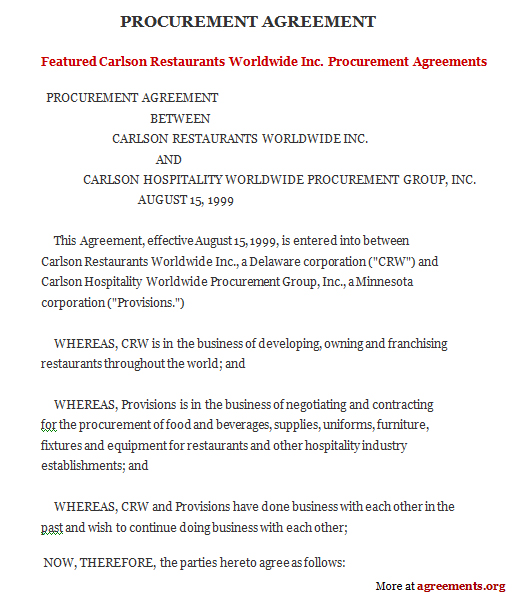What is a procurement agreement? Procurement contract agreements are contracts that provide the legal framework to any transaction wherein the buyer (usually governments or corporations) is looking to purchase goods or services of any kind. It defines the relationship of the contracting parties, remuneration, mode of payment, and any other important details of the transaction. It is in the best interest of the buyer to draft a contract that explicitly and effectively establishes the terms of the transaction to avoid any disputes that could possibly arise from miscommunication.
When Do You Need a Procurement Contract?
Procurement contracts find application across industries and businesses of all kinds, though governments and large corporations employ them the most. Any transaction involving the acquisition of goods or services from a vendor or other external source should, ideally, be governed by such a contract. If the products or services are internally sourced and do not involve an external party, there is no need for a contract. There are several types of procurement contracts, and the suitability will depend on the specific use-case scenario. A procurement contract example could be suitable on a fixed-price contract in one scenario but not in another scenarios.
Inclusions in Procurement Contracts
The most important terms in a procurement contract include the names and descriptions of the contracting parties, the date on which the contract comes into effect, the governing jurisdiction, the terms of remuneration, location, timeframe, exclusions, and any provisions for alternative dispute resolution methods. It must also specify the details of the goods or services that are to be acquired, the method of selection of products and vendors, negotiation methods, and terms of delivery.
How to Draft Procurement Contract?
Procedure to draft a procurement agreement:
- Start your contract with the names of the contracting parties and description of the purchase of the goods or services.
- Explicitly mention the date on which the agreement will come into force.
- Specify the governing jurisdiction.
- Define the circumstances of the transaction and the products/services it involves.
- Define the document and its annexes, collectively, as the agreement governing the transaction. Also, specify the order of precedence of the documents such that the main document has precedence over its annexes.
- Define the terms of payment, warranty, delivery and any other important clauses.
- Define all terms and conditions regarding the transaction, including those relating to termination, amendment and modification of the contract.
- Mention any exceptions to the contract and consider including a clause to provide for alternative dispute resolution methods.
Benefits of Procurement Contract
- Procurement contracts can help a business limit their costs and reduce their financial liability by transferring it to the vendor; this is especially true for fixed-price contracts wherein the products and services required are described in detail and the price for it is fixed. Once the vendor agrees to the terms of the contract, he is bound to finish the job within the agreed budget and would have to bear any overheads.
- While oral agreements are more often than not valid from a legal perspective, they might be impractical to enforce in court because it is hard to prove the very existence of a verbal contract. However, there is physical evidence in the case of written procurement contracts which expressly define the responsibilities of each contracting party and the terms by which they are bound, this avoids any ambiguity and miscommunication and allows for easy resolution of disputes.
Types of Procurement Contracts
- Fixed-Price Contracts: A sample of the agreement can be downloaded from below. Used when the scope of work is definite and not subject to change. They can be of three types:
- Firm-Fixed-Price: These contracts require that the vendor complete the job within the agreed time and budget.
- Fixed-Price Incentive Fee: Used to incentivise the performance of the seller.
- Fixed-Price with Economic Price Adjustment: Used to counteract the effects of inflation in long-term projects.
- Cost Reimbursable contracts: Best suited to projects whose scope is not limited. They can be of four types:
- Cost Plus Fixed Fee: Here, the buyer bears the risk and pays the seller for all costs.
- Cost Plus Incentive Fee: The buyer pays the seller the costs and incentivises better performance.
- Cost Plus Award Fee: The buyer covers all costs and can choose to award the seller based on arbitrary satisfaction.
- Cost Plus Percentage of Cost: The buyer pays the costs and an added percentage of the costs.
Key Terms/Clauses in Procurement Contract
A standard procurement agreement template would include the following key terms and clauses:
- Disclaimer: The purpose of this clause is to limit the legal liability of the contracting parties. Vendors might push you to limit their liability to the cost of the products or services rendered to you, however, you should make sure that such clauses don’t prevent you from exercising your right to legal remedy in the case of gross misconduct.
- Goods and Services: This term specifies the details of the goods and services that are provided to you and ensure that both parties agree to transact the same things in the same sense. You should make this clause as detailed as possible to avoid any miscommunication.
- Payments: This clause clearly and explicitly mentions the amount, mode of payment, incentives, penalties, and due dates.
- Breach: This clause defines what actions (or lack thereof) constitute a breach of contract.
Download a Procurement Contract Template Now!
The Procurement contract sample can be downloaded from below.
